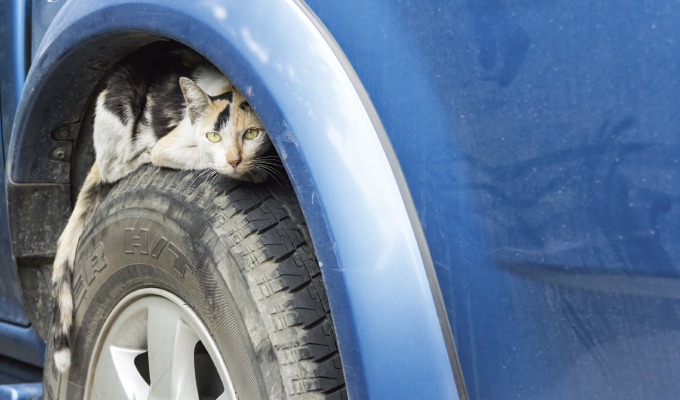We depend on work vehicles and expect them to function reliably. Like personal vehicles they need routine help to ensure they fulfill their purpose. Most of the vehicles are covered by a maintenance schedule, but it’s up to us to make sure it’s followed.
Another concern for work trucks, especially those stored outdoors, as the weather gets colder is rodents. Some important maintenance considerations that everyone should review and put on their to-do list before winter arrives are:
- Check the tire pressures. Tire pressure goes down in the cold and that can lead to excessive gas usage, or flat tires when we least expect it.
- Change the oil and in colder climates switch to a lighter weight oil. It makes it easier to start the engine.
- Check the battery. At colder temperatures all batteries (including those for EVs) have a much more difficult time working. The chemical processes that are in use work less efficiently in the cold.
- Change your radiator fluid. This prevents it from freezing or clogging up. This task is often overlooked until it’s a problem. If you haven’t done it in the last three to five years, get it done.
- Lubricate the chassis. Older vehicles have lubrication fittings. Metals contract and lubricants are less fluid in the cold, leading to failure.
- Fill your windshield washer fluid with non-freezing cleaner. This helps immensely on frosty days and keeps the lines from clogging.
- Watch out for rodents. Especially if your work vehicle is only in use Monday to Friday, which means it’s not moving for a few days, making it a nice home for cold rodents after you park it. Use preventative measures like baited traps away from the vehicle or a more active solution like truck covers. CoverSeal is one example and it has a weighted bottom apron that blocks the rodents from getting under and into the vehicle.
Rodents aren’t just an inconvenience; they can cause serious and costly damage to work trucks. At the light end of the spectrum, rodents might make a mess of the engine compartment, filling it with nuts, food wrappers, and nesting materials. More devastating, and costly, they have also been known to chew on the wires in vehicles, leading to lights not working or the vehicle not starting. Repairs can cost thousands of dollars, so prevention is protection. Beyond covering a truck with a cover, other commonly suggested fixes include using traps, bait, repelling scents, and noisemakers.
Here is a summary of various methods and how effective they are.
Rodent baits – These are like traps. The major downside is they can kill other animals that might get into the bait or that eat the rodents after they’ve ingested the poison, including pets.
Feline spray – the results of using this method are questionable. You can be guaranteed it will make your vehicle smell though. Another downside, it must be reapplied after rains and periodically.
Irish spring flakes, moth balls, peppermint oil and dryer sheets – these are questionable home remedies found on internet forums. They are not effective. Rodents live in sewers and in garbage dumps which are some of the worst smelling places on earth and they thrive there. They get used to bad smells.
Noise makers and strobe lights – In 2014 the University of Arizona (N. Aflitto, T. DeGomez) published a paper that added more evidence to a growing body of studies on the effectiveness of these devices. Their conclusion was that they were, “not effective.” Another study conducted in 2002, for the Journal of Agricultural and Urban Entomology found them to decrease the amount of rodent presence for two to three weeks before the rodents became used to the environment. Bottom line: not an effective solution.
Internet experts offer other practical advice like don’t store food in your vehicle. That’s common sense, if your vehicle is full of food or wrappers that belong in the garbage, your vehicle is naturally going to be more attractive to rodents than a clean one.
Some people suggest lifting the engine hood, which is effective but not practical. It also doesn’t help with any damage rodents may cause to the rear of the car. Avoid parking in thick underbrush. Another commonsense suggestion that does not apply to most people’s rodent problems. The best advice is to make it impossible for rodents to access your work truck in the first place and you’ll make it through winter without any costly rodent repairs.
about the author
Ken Huening is the inventor and CEO of CoverSeal. An avid collector of exotic and classic vehicles, he has experienced rodent damage on more than one occasion. To his dismay, most solutions on the market to deter rodents were either impractical or ineffective. He created CoverSeal as an easy and complete protection solution. To learn more, visit www.getcoverseal.com.




